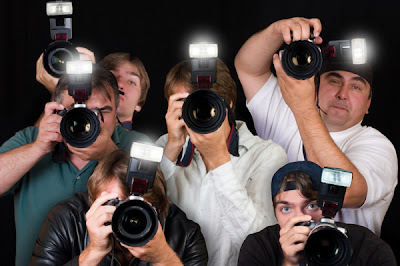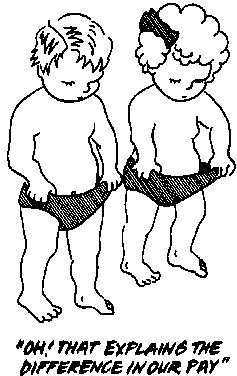
In response to my post this week on media relations, Thorn Coyle says (here and in comments at the Wild Hunt):
Agreed overall and to add in, here is what I wrote at Wild Hunt earlier today :
The other thing to keep in mind is that some reporters actually think they are doing us a favor by asking things like, "what about they way you are portrayed in films?" or "some people think you worship the devil, do you?" by giving us a chance to 'set the record straight'. These questions are not our friends, but they are also very hard to get around. So it isn't that we think, "hmm, in telling the press who Pagans are and what we believe, we will talk about silly movies and devils!" It is that we have just given them 5-10minutes (to an hour's worth) of what we think is great footage about what we believe and practice, broken into short sound bites even, and then we answer that little question in the middle of it all, just to get it out of the way and get back to our talking points, and they cut everything else.
I don't think I did too badly, all in all, and tried to use humor to diffuse the question, but what I would have done differently - were I more TV savvy - was to give them half an answer to the silly question, and made sure the sentence itself ended in another talking point. This is very hard to do, but next time, I will make a concerted attempt at it.
So, all in all, I *have* thought about what I want to say. I *do* have my elevator speech down. At the end of my interview, the reporter even said, "You are a public speaker, aren't you?" But he didn't use that stuff at all. This is why I've avoided the TV shows I have been asked to do in the past. I don't trust that the good stuff will get out there.
But perhaps it is time to try harder. I will likely take it on a case by case basis.
I think that Thorn needs to be on tv and I endorse Thorn's take-away: "give them half an answer to the silly question, and ma[k]e sure [that] the sentence itself end[s] in another talking point," and a point that Markarios made in comments here: Dealing with the media isn't an occult art, it's a skill one can [easily] learn. But it does require learning. Teacats also makes a v good suggestion: Pagan gatherings (Pantheacon, I'm looking at you) should include training sessions for Pagans who expect to be in contact with the media. (Teacats was also the first to suggest that someone must, at some point, have already put together some training on dealing with the media. Surely someone has?) There are Pagan members of the media. Let's use the resources we have.
It seems to me that there are two sub-issues here.
One is (and, from the articles that I read, this is, in fact, a real problem) Pagans who, themselves, volunteer that we don't [worship Satan, dance naked, drink blood, sacrifice animals, ever do magic to bind, etc.] (Thorn makes clear that she did not do this. See, however, some of the links in my original post.) DON'T DO THIS. If you're organizing a Pagan Pride Day event, your objective is NOT (no, trust me, it is NOT) to overcome stereotypes about Pagans. Your objective is to highlight the fact that Pagans have a proud and ancient past and are, today, engaged in many wonderful pursuits. (And, please, don't say that Pagans don't do things that we, you know, do. Some of us do worship skyclad. Some Pagans do sacrifice animals. Some of us do engage in sex magic. Thorn noted in comments at the Wild Hunt that some of us do dance naked on beaches around wickermen, although not generally wickermen that are filled with live sacrifices. Do NOT begin by accepting the conventional framing that there's something "wrong" with those practices, which is precisely what you do by announcing that we don't do them.)
Another is what happens when the interviewer brings up negative stereotypes (which they do because that helps them sell Viagra; believe me, they are NOT trying to "help" you.) Here, it's important to remember what my Criminal Law prof explained about what happens when, having been arrested, you get interviewed by the "good cop." The good cop does this shit every day of her life; it's how she makes her living. She knows what's going on and how it's going to end. At the end of the day, she's going home to dinner; she's not worried about the entire rest of her life. You are on unfamiliar ground. You've quite likely has never been in this situation before. You are scared shitless. But you've had plenty of talks w/ reasonable folks and, at some point, after the good cop has discussed how hot it is, and asked if you'd like a glass of water, and mentioned that the Ravens are playing tonight, and asked about your [cat, kids, mother], you think, "Well, I've had lots of talks with reasonable people and this nice lady seems like a reasonable person. In fact, she seems to want to help me. I'm smart; I can finesse this. (Here is where you start to fuck up.) I'll just explain to her what happened and we can wrap this all up." And, a few days later, when you have to hire the lawyer that, trust me, you are going to have to hire, she will bang her head on her desk and wonder why on Earth you couldn't just shut up and say, "I want a lawyer." You don't (necessarily) need a lawyer to talk to the press, but you do need to get prepared so that you even the playing field. To wit:
*Go to Carnegie Hall (And we all know how to get there, right? Practice, practice, practice). IANAME (I am not a media expert), but I am a lawyer and I've dealt with some fairly high-profile cases in my time. No lawyer would imagine going before an appellate panel (where a group of judges fire questions at you about your case) or SCOTUS without first doing several moot courts. That's where you get other lawyers to read all the briefs and ask you the questions that they think the judges will ask you. (Often, these are taped, so that the lawyer who will be doing the argument can watch her body language, etc.) Afterwards, there's a massive amount of critiquing and discussion about how to refine the answers. This process may well get repeated several times. In every appellate case that I've ever done: the more moot courts, the better the oral argument. Similarly, lawyers who do jury trials often hire mock juries, present their case to them, then pay the mock jurors to sit and tell them what they did right and wrong (when I retire, I want to be a mock juror, but they tend not to want lawyers). Any lawyer whose client is about to be deposed (by the other side's lawyer before trial) preps the client. And large law firms spend hours prepping clients, even media-savvy clients, before they're allowed to testify before Congress, go on Face the Nation, etc.
It's not difficult to think of the kinds of questions that a reporter is likely to ask a Pagan (Do you worship Satan? Well then why does your god have horns? Can you really do magic? Do you do rituals naked? What do you think about what Christine O'Donnell said?, Why do you wear robes?, etc.) Have a friend ask you those questions and, if they've got even an iPhone, have them video you. Figure out where they threw you off and how you could have, instead, controlled the interview and used it to achieve your objectives, rather than the reporter's. Then do it again. And again. One more time. Three's a magic number.
Which brings me to Point the Second:
*Know your objectives AHEAD of time. This is more than knowing your basic "elevator speech" -- this is knowing what you want to walk away from the interview having achieved. Someone from the press calls and asks if you'll talk to them. Do you say "yes," or "no"? Well, that depends on what your objectives are. As I noted in my earlier post, there are two general objectives you're likely to have. One is that you want to use the interview to promote your book/event/self as an authority on Pagan topics, etc. Another is to get across some basic fact: for example, that Druids are a lot like everyone else or that Pagans are proud of their ancient heritage and modern accomplishments. Just as you don't want to simply walk into a circle and begin raising energy w/o a clear idea of where you're going to direct it, you don't want to walk into the media circle and begin talking without a clear understanding of what you want to accomplish by devoting your energy to the interview. Once you are clear on why you're doing the interview, on what message you want to get across, it's easier to control the interview and not just answer the interviewer's dumb question ("Well, do you worship Satan?") to get it out of the way, which, trust me, is the only bit that will show up on the evening news or in the magazine article.
*Bring a (well-thought-out, thoroughly-critiqued, and, please Goddess, spell-checked (no, the "mundane" kind of '"spell"), and grammatically-correct) handout to the interview with you. (Word processing is magic; you can adjust these for each individual interview.) Now that you know your objective, this is where you list the points that you want to get across (your "elevator speech" for this interview). It should include information about you, as well, perhaps on a second page or a Rolodex card. "Wendy Witch is the author of five books on Pagan practices. She has presented on topics X, Y, and Z at the following conferences. Her life has been devoted to demonstrating that [Druids are just like everyone else, whatever.] Born in Oklahoma, Wendy attended Harvard Divinity School and now owns and operates Wiccan Wood, a store that sells wooden statues of the Goddess. She can be contacted at . . . ."
*If you're trying to make the point that, for example, Druids are just like everyone else, consider what clothing, make-up, etc. will help you to make that point. If you can't make yourself wear that stuff, maybe you're not the right person to make that point. What point are you the right person to make? If you want to come across as an authority, are there props that would help you do that? (Podiums, a background bookshelf filled with books, a wall full of diplomas. Or, redwoods, a beach, a blazing fire, a desk covered with globes. Come on; think. We're supposedly folks who understand how Younger Self works. And yet, when we talk to the media, we almost always act as if Younger Self doesn't exit.) Can you move all the empty plastic chairs out of camera view? Do you have a copy of your book or the sign for your Pagan Pride Day prominently displayed?
*The problem that I've discussed isn't limited to tv news. Newspapers, magazines, radio, blogs, etc. matter. Many people being interviewed bring a pocket recorder with them and turn it on at the beginning of the interview. No reputable reporter should object to you having your own record of what was said. And, if your words get sliced, diced, taken out of context (surprising, I know, but it does happen), you can put up the audio on your own blog and make clear what really happened.
*Understand framing. There are a number of good books out there on this topic; as noted before, I like George Lakoff's Don't Think of an Elephant, but you may find others that you like even better. Here's Lakoff (who, I admit, is more optimistic about the role of the media than is Hecate) discussing the issue of marriage equality:
Try this: "Do you think the government should tell people who they can and can't marry?" Or "Do you think the freedom to marry who you want is a matter of equal rights under the law?" Or "Do you see marriage as a the realization of love in a lifetime commitment?" Or "Does it benefit society when two people who are in love want to make a public lifetime commitment to each other?"
Reframing is everyone's job.
If you get stuck, can you at least answer with a question that challenges the framing? And then move immediately to your objective: "Of course, Druids are just like everyone else, so we . . . ."
I keep harping on this point and on capitalization because they matter. I'm going to keep harping.
Picture found here.





